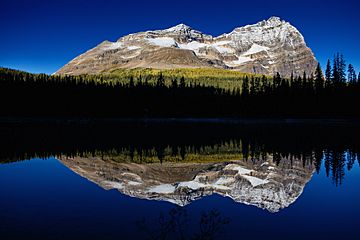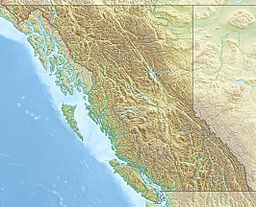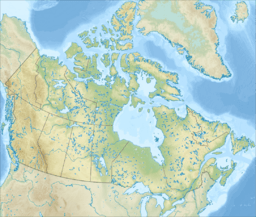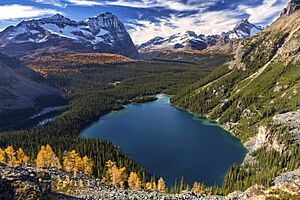Odaray Mountain facts for kids
Quick facts for kids Odaray Mountain |
|
|---|---|

Odaray Mountain reflected in Lake O'Hara
|
|
| Highest point | |
| Elevation | 3,137 m (10,292 ft) |
| Prominence | 627 m (2,057 ft) |
| Parent peak | Mount Stephen (3200 m) |
| Listing | Mountains of British Columbia |
| Geography | |
| Location | British Columbia, Canada |
| Parent range | Canadian Rockies |
| Topo map | NTS 82N08 |
| Geology | |
| Age of rock | Cambrian |
| Type of rock | shale, limestone |
| Climbing | |
| First ascent | 1887 by James J. McArthur (solo) |
| Easiest route | Scrambling |
Odaray Mountain is a tall peak, about 3,137 meters (10,292 feet) high. It stands proudly west of Lake O'Hara in Yoho National Park, which is part of the amazing Canadian Rockies in British Columbia, Canada. The closest taller mountain is Mount Huber, about 3.86 kilometers (2.4 miles) to the east.
If you wanted to climb Odaray Mountain, the usual path follows the southeast glacier and ridge. This route often starts from the Elizabeth Parker hut, a popular spot for hikers. The name "Odaray" sounds like "ode array."
Discovering Odaray Mountain: A Look at Its History
The first time someone officially climbed Odaray Mountain was in 1887. A person named James J. McArthur made this climb all by himself. He gave the mountain the name Odaray. This name comes from the Stoney language and means "many waterfalls."
However, there are other stories about how the mountain got its name. Some say it was named in 1894 by Samuel Evans Stokes Allen. He supposedly named it after a Stoney Indian word for "cone."
It's also possible that McArthur only climbed a smaller peak nearby. This peak, about 2,965 meters (9,728 feet) high, is now called Little Odaray. It is located southeast of the true summit. The mountain's current name, Odaray Mountain, became official in 1952. This happened when the Geographical Names Board of Canada decided to remove the older name, Mount Odaray.
Understanding Odaray Mountain's Geology
Odaray Mountain is made up of sedimentary rock. This type of rock forms from layers of mud, sand, and tiny bits of plants and animals that settle over time. These layers were laid down during very long periods in Earth's history, from the Precambrian to the Jurassic times.
These rocks formed in shallow seas that once covered the area. Later, during a major mountain-building event called the Laramide orogeny, these sedimentary rocks were pushed up. They moved east and even slid over younger rocks, creating the mountain shapes we see today.
Climate Around Odaray Mountain
Odaray Mountain is located in a subarctic climate zone. This means it has very cold and snowy winters. The summers are usually mild. Temperatures can often drop below −20 °C (−4 °F). With the wind, it can feel even colder, sometimes below −30 °C (−22 °F).
The water from rain and melting snow on Odaray Mountain flows into small streams. These streams eventually join the Kicking Horse River. The Kicking Horse River is a larger river that then flows into the Columbia River.
 | Sharif Bey |
 | Hale Woodruff |
 | Richmond Barthé |
 | Purvis Young |




